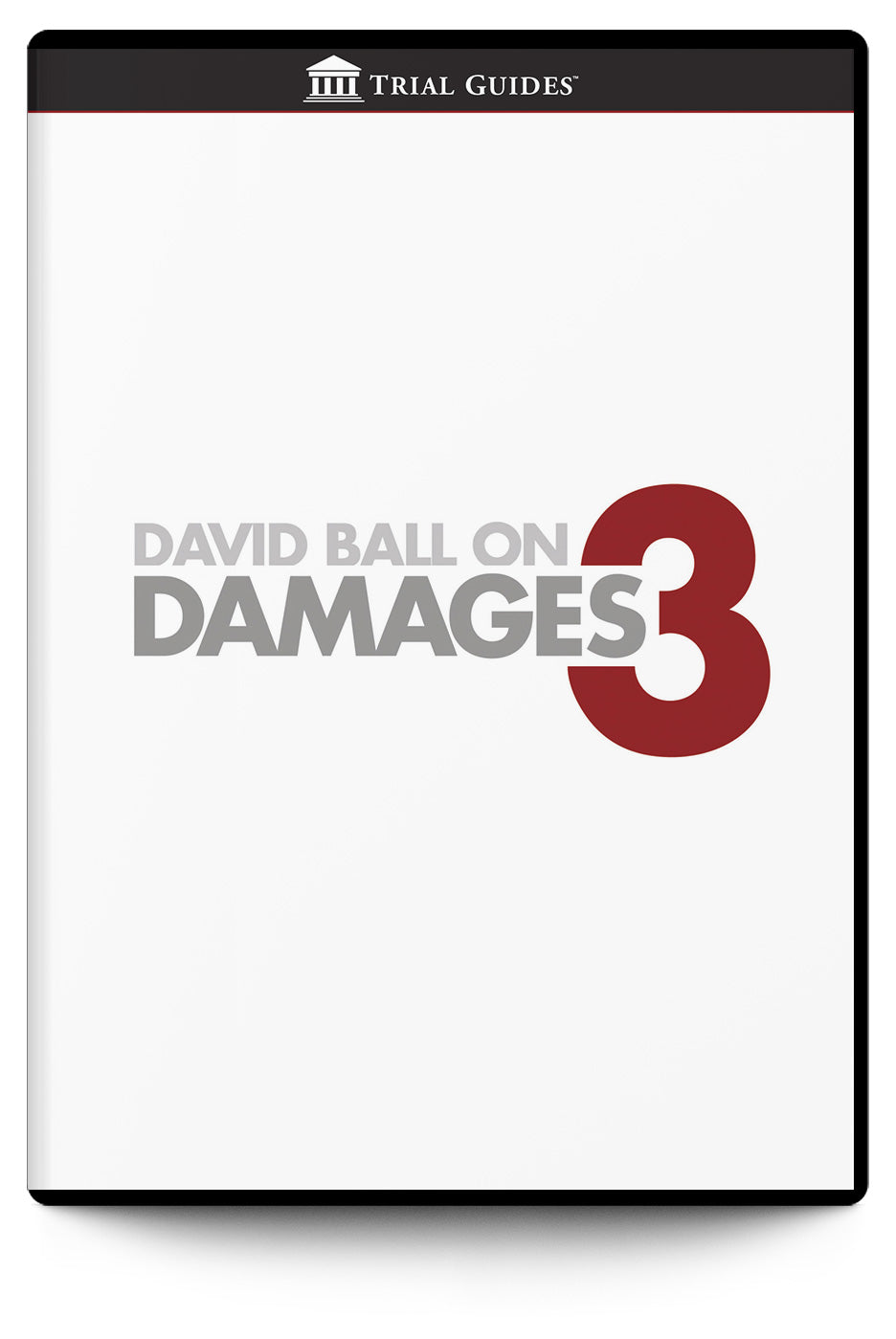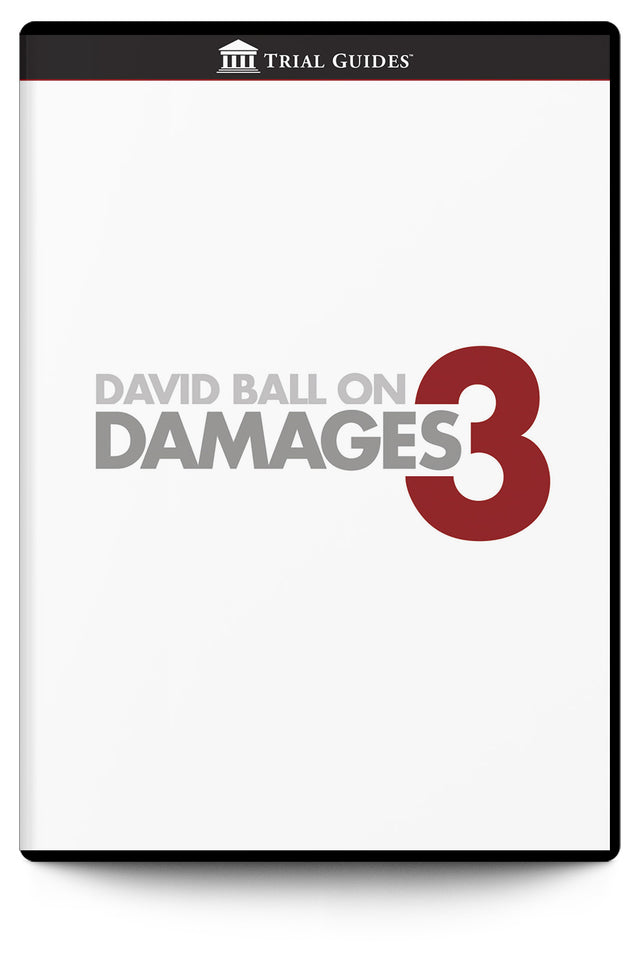Description
Description
Publisher's note: This is the audiobook version of the Trial Guides hardback edition of David Ball on Damages 3. David Ball reads you the content on this book.
David Ball on Damages is America's bestselling text on proving damages. Now, David Ball on Damages 3 teaches you how to integrate the Reptile and Rules of the Road methods, along with new voir dire techniques, into the classic Damages method. Damages 3 provides step-by-step guidance on how to prepare opening statements; how to handle cross-examinations and defense "expert" examinations; and new, key methods that explain the relationship between liability and damages. David Ball on Damages 3 is filled with improvements and refinements based on thousands of hours of research and real case preparation that Ball and his partner, Artemis Malekpour, have uncovered since the second edition's 2005 release. Ball explains why jurors give, why they do not, and how to motivate them to provide a large verdict. Damages 3 provides practical, effective, and innovative methods for pursuing damages, while alerting readers to pitfalls that both new and experienced attorneys are prone to. The techniques and tools that Damages 3 provides counter sophisticated opposition tactics, the public mood, and laws and rules that continue to grow more hostile.
Please Note: If you choose the Audiobook option, you can access it through the Trial Guides App for Lawyers button on your account page.
Author
Author
Details
Details
CD/Audio Digital Download: 788 minutes; 12 discs; 3rd edition (2011); ISBN: 978-1934833407
Publisher: Trial Guides, LLC
Table of Contents
Table of Contents
Disc 1 [69:54]
- David Ball on Damages 3
- Preface
- Introduction
- Chapter 1. Fundamentals
- Introduction: The Poisoned Pool
- Fundamental One: Juror Self-Protection
- Fundamental Two: Proportion of Time on Harms and Losses
- Fundamental Three: You
- Fundamental Four: Client's Point of View
- Fundamental Five: Defendant Conduct
- Fundamental Six: Inadvertent Wrongdoing
- Fundamental Seven: Worthwhileness of Money
- Fundamental Eight: Fix, Help, Make Up For
Disc 2 [69:53]
- Chapter 1 (continued). Fundamental Nine: Degree of Harms and Losses
- Fundamental Ten: Who Gets the Money?
- Fundamental Eleven: Importance
- Fundamental Twelve: Going Home Afterward
- Fundamental Thirteen: Compromise Kills
- Fundamental Fourteen: Seen Worse, Been Worse
- Fundamental Fifteen: People Should Pay for Their Own Problems
- Fundamental Sixteen: Divine Punishment ("God is My Co-Juror")
- Fundamental Seventeen: Don't Wanna Punish the Defendant
- Chapter 2. Noneconomic Damages
- Obstacle 1: No Worthwhileness
- Obstacle 2: No Way to Calculate
- Obstacle 3: Can’t Define "Compensation"
- Obstacle 4: Defense Plea for Jury Nullification
- Obstacle 5: Bad Comparison to Economic Damages
- Obstacle 6: Why Pay Family to be Caretakers? Why Pay for Professional Care When the Family Can Do It?
- Obstacle 7: "Even If That's the Right Amount, It's Far Too Much for Any Individual"
- Chapter 3. Rules for Jurors: Preponderance; Harms and Losses Only
- The Preponderance Template
- The Preponderance Formula
- Preponderance Template: Jury Voir Dire
Disc 3 [67:19]
- Chapter 3 (continued). Preponderance Template: Opening (The Boilerplate Tag)
- Preponderance Template in Plaintiff's Testimony
- Preponderance Template in Defense Testimony
- Preponderance Template in Closing
- Preponderance Template: Conclusion
- The Harms-and-Losses-Only Template
- The Harms-and-Losses-Only Template: Jury Voir Dire
- The Harms-and-Losses-Only Template: Opening
- The Harms-and-Losses-Only Template: Testimony
- The Harms-and-Losses-Only Template: Closing
- Chapter 4. With or Without Jury Voir Dire
- Voir Dire Limitations: Fight Them! No Voir Dire? Fight for It
- Juror's First Impression: Primacy and Persistence
- How to Ask
- Tort "Reform"
- Noneconomic Damages: Spotting Problem Jurors
- Other Noneconomic Elements
- Tolerance for Pain
- Asking about (or Sneaking in) a Specific Figure in Voir Dire
- Asking About Caps
- Juror Demographics Affecting Damages
Disc 4 [69:27]
- Chapter 4 (continued). Personality Traits
- Religion Matters
- Inadvertence
- Leaders
- Child Witnesses
- Paid Experts
- Multiple Survivors
- Harms Consultants
- Harms and Losses List
- Final Thoughts
- Chapter 5. Opening Statement
- Introduction
- Your Standing with the Jury
- Structure
- The Template
- The Template
- Opening. Part I: Primary Rule(s)
Disc 5 [62:21]
- Chapter 5 (continued). Opening. Part II. Story of What the Defendant Did
- Opening. Part III. Who We are Suing and Why
- Opening. Part IV. Undermine
Disc 6 [67:48]
- Chapter 5 (continued). Opening. Part V. Causation and Damages
- Opening. Part VI: "Before"
- Damages-Only Case
- Loss of Personal Image
- Beware the Unknown: What Jurors Don’t Know Can Clobber You
- Keep Jurors Listening
- Fear of Not Understanding
- Motivations
- Loss of Consortium
- E-nun-ci-ate
- Stop the Bullet Points
- Dress Approachably
- Decorate Yourself Modestly and Moderately
Disc 7 [68:57]
- Chapter 5 (continued). Length of Opening
- Eye Contact
- Movement
- Rehearse
- Lighting
- Chapter 6. Direct Examination
- Mud and Gold (Less Mud = More Gold)
- Controlling Your Witness on Direct ("What happened next?")
- Short Questions
- Don't Make Your Client a Whiner
- How Does that Make You Feel?
- Spouse
- Before and After Witnesses
- How Many?
- Stories
- Hollow Advocacy
- Witnesses as Sources of Worthwhileness
- Sequence of Witnesses: Damages Witnesses
- Children
- Grief and Pain Counselors
- Minimum Life-Care Plans (and Equivalents)
- Using Liability Witnesses for Damages
- Day-in-the-Life Videos
- Should Your Client Be in Trial?
- Client In and Out of Trial
- The Best and Cheapest Experts: High School Teachers
- Paid Plaintiff's Experts
- How to Use Experts
Disc 8 [53:18]
- Chapter 7. Cross-Examination
- Rules for Analysis
- Hitchhiking: Use Defense Liability Experts for Damages
- Undermining Defense Life-Expectancy Estimates
- Undermining Accusations of Malingering and Exaggeration of Symptoms
- "Litigation Syndrome" and Other Bogusaria
- Control
- Chapter 8. Closing
- Overview
- When to Write It
- Make Jurors Listen
- Teaching Your Favorable Jurors How to Win (Arming Them)
- Keep on KISSING!
- Why Are You Saying That?
- Help Jurors Respond to the Folks at Home
- Essentials for Closing
- Minimum Life-Care Plan in Closing
Disc 9 [56:41]
- Chapter 8 (continued). Massaging the Jury Instructions and Questions
- Language
- Intangibles Argument: Ratio to Tangible Losses
- Holistic Damages
- SCALES: Calculating the Intangible Losses
- Admit Some Fault
- Comparative Fault: Double Dipping
- Proportions: The Damages Circle
- How Do You Decide on Appropriate Amounts?
- Jurors' Weekends and Other Treasures
- The First Thing You Think
- Two Futures
- Safety
- Judo Law and "The Gift of Malingering"
- Vague Language
- People Care v. Money Care
- Closing: Quickies
- Chapter 9. Public Respect and Trust: Restore It and Deserve It
- The Problem
- The Foolproof Solution
Disc 10 [63:57]
- Chapter 9 (continued). Does It Work?
- The Specifics
- A Potpourri of Good Works
- Rejecting Cases
- Organizations
- Show the World
- Epilogue
- Appendix A. Jury Voir Dire
- The Law
- Rule #1
- Open-Ended Questions
- The All-Purpose Follow-Up Questions
- Demographics: The Error
- The Worst Role Model: The Defense
- Poisoning the Jury
- Inoculation: Anticipating Defense Poison Questions
- Inoculate
- Creating Inoculation Questions
- Which Inoculation?
Disc 11 [68:57]
- Appendix A (continued). "Why Is She Asking About That?"
- Home
- Get the Whole Answer
- Interrupting
- Rewording
- Get Them Talking
- Enjoyment v. Control
- Voir Dire: To See Speaking
- Conditioning
- When the Judge Stops You
- Identifying Leaders
- Depth of Attitude/Opinion/Belief
- The Last Six Questions
- Challenging for Cause
Disc 12 [69:15]
- Appendix A (continued). Pretrial Rehearsal
- Judge Approved Questions; Judge-Conditioned Voir Dire
- Appendix B. Story for Opening Statements
- Storytelling
- Appendix C. Sample Opening
- Appendix D. Differential Diagnosis in Med Mal Opening
- Appendix E. Sample First-Person Story for Closing
- Acknowledgements for the Third Edition
- A Final Word
Total running time: 13 hours, 8 minutes




